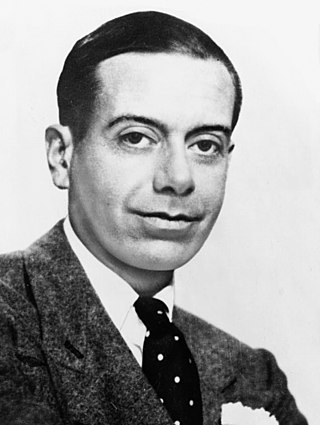
Cole Albert Porter was an American composer and songwriter. Many of his songs became standards noted for their witty, urbane lyrics, and many of his scores found success on Broadway and in Hollywood films.

Ethel Merman was an American actress and singer. Known for her distinctive, powerful voice, and her leading roles in musical theater, she has been called "the undisputed First Lady of the musical comedy stage." She performed on Broadway in Anything Goes, Annie Get Your Gun, Gypsy, and Hello, Dolly!

Anything Goes is a musical with music and lyrics by Cole Porter. The original book was a collaborative effort by Guy Bolton and P. G. Wodehouse, revised considerably by the team of Howard Lindsay and Russel Crouse. The story concerns madcap antics aboard an ocean liner bound from New York to London. Billy Crocker is a stowaway in love with heiress Hope Harcourt, who is engaged to Lord Evelyn Oakleigh. Nightclub singer Reno Sweeney and Public Enemy Number 13, "Moonface" Martin, aid Billy in his quest to win Hope. Songs introduced that later became pop and jazz standards are "Anything Goes", "You're the Top", "All Through the Night", and "I Get a Kick Out of You".

Fifty Million Frenchmen is a musical comedy with a book by Herbert Fields and music and lyrics by Cole Porter. It opened on Broadway in 1929 and was adapted for a film two years later. The title is a reference to the hit 1927 song "Fifty Million Frenchmen Can't Be Wrong" by Willie Raskin, Billy Rose, and Fred Fisher, which compared free attitudes in 1920s Paris with censorship and prohibition in the United States. The musical's plot is consistent with the standard boy-meets-girl plots of musical comedies of the first half of the twentieth century.

Girl Crazy is a 1930 musical by George Gershwin with lyrics by Ira Gershwin and book by Guy Bolton and John McGowan. Ethel Merman made her stage debut in the first production and co-lead Ginger Rogers became an overnight star. Rich in song, it follows the story of Danny Churchill who has been sent to fictional Custerville, Arizona, to manage his family's ranch. His father wants him there to focus on matters more serious than alcohol and women but Danny turns the place into a dude ranch, importing showgirls from Broadway and hiring Kate Forthergill as entertainer. Visitors come from both coasts and Danny falls in love with the local postmistress, Molly Gray.

Panama Hattie is a 1940 American musical with music and lyrics by Cole Porter and book by Herbert Fields and B. G. DeSylva. The musical is about a nightclub owner, Hattie Maloney, who lives in the Panama Canal Zone and ends up dealing with both romantic and military intrigue. The title is a play on words, referring to the popular Panama hat.
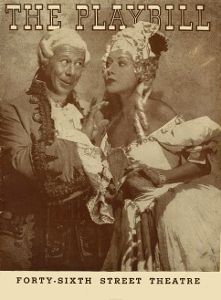
Du Barry Was a Lady is a Broadway musical, with music and lyrics by Cole Porter, and the book by Herbert Fields and Buddy DeSylva. The musical starred Bert Lahr, Ethel Merman and Betty Grable, and the song "Friendship" was one of the highlights. The musical was made into a 1943 Technicolor film Du Barry Was a Lady, starring Red Skelton, Lucille Ball, Gene Kelly and Tommy Dorsey and his orchestra.
Paris is a musical with the book by Martin Brown, and music and lyrics by Cole Porter, as well as Walter Kollo and Louis Alter (music) and E. Ray Goetz and Roy Turk (lyrics). The musical, which premiered on Broadway in 1928, was Porter's first Broadway hit. The musical introduced the song "Let's Do It, Let's Fall in Love" sung by the show's star, Irene Bordoni. The story involves a young man from a very proper family in Newton, Massachusetts whose mother is horrified by his intention to wed a French actress.
"It's De-Lovely" is one of Cole Porter's hit songs, originally appearing in his 1936 musical, Red Hot and Blue. It was introduced by Ethel Merman and Bob Hope. The song was later used in the musical Anything Goes, first appearing in the 1956 film version ; in the 1962 revival where it was sung by Hal Linden and Barbara Lang, and in the 2004 biographical film De-Lovely, where it was performed by Robbie Williams.
Something for the Boys is a musical with music and lyrics by Cole Porter and a book by Herbert Fields and Dorothy Fields. Produced by Mike Todd, the show opened on Broadway in 1943 and starred Ethel Merman in her fifth Cole Porter musical.

Anything Goes is a 1936 American musical film directed by Lewis Milestone and starring Bing Crosby, Ethel Merman, Charles Ruggles and Ida Lupino. It is based on the 1934 stage musical Anything Goes by Guy Bolton and P. G. Wodehouse, which included songs by Cole Porter.
"Down in the Depths (on the Ninetieth Floor)" is a torch song written by Cole Porter, for his 1936 musical Red, Hot and Blue, in which it was introduced by Ethel Merman. The lyric scheme juxtaposes images of high and low. It is a lament from the point of view of a rich woman in a penthouse apartment higher than any building but the Empire State Building, who looks down on the busy city life below her but nevertheless feels she is at the lowest and poorest point of her life because she is lonely. Porter's melody is musically intertwined with the lyric scheme in a similar manner to his song "Ev'ry Time We Say Goodbye."
"Ridin' High" is a 1936 popular song written by Cole Porter, for his musical Red, Hot and Blue, where it was introduced by Ethel Merman.
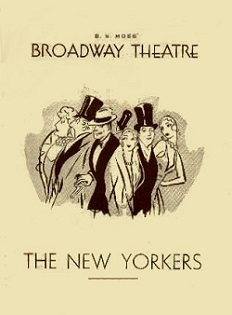
The New Yorkers is a musical written by Cole Porter and Herbert Fields (book). Star Jimmy Durante also wrote the words and music for the songs in which his character was featured.

Let's Face It! is a musical with music and lyrics by Cole Porter. The book by Herbert and Dorothy Fields is based on the 1925 play The Cradle Snatchers by Russell Medcraft and Norma Mitchell.
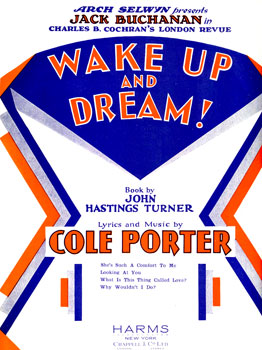
Wake Up and Dream is a musical revue with a book by John Hastings Turner and music and lyrics by Cole Porter and others. The most famous song from the revue is the Porter standard "What Is This Thing Called Love?"
Klea Blackhurst is an American actress. She is best known for Everything the Traffic Will Allow, her tribute to Ethel Merman that debuted in New York in 2001. Among many accolades, this production earned her the inaugural Special Achievement Award from Time Out New York magazine. The recording of Everything the Traffic Will Allow was named one of the top ten show albums of 2002 by Talkin' Broadway.com.
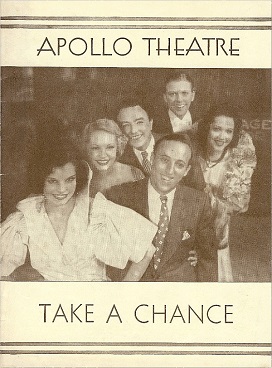
Take a Chance (1932) is a musical with lyrics by B. G. De Sylva and music by Nacio Herb Brown and Richard A. Whiting, with additional songs by Vincent Youmans, and book by De Sylva and Laurence Schwab.
Hitchy-Koo of 1919 is a musical revue with music and lyrics by Cole Porter and a book by George V. Hobart. This revue was third in a series of four Hitchy-Koo Broadway revues from 1917 to 1920 produced by, and starring, Raymond Hitchcock. The revues were named after the 1912 popular song "Hitchy-Koo" by composers Lewis F. Muir and Maurice Abrahams with lyrics by L. Wolfe Gilbert; the only song which was featured in all of the Hitchy-Koo revues. The original Broadway production of this version played in 1919. The revue received favourable reviews.
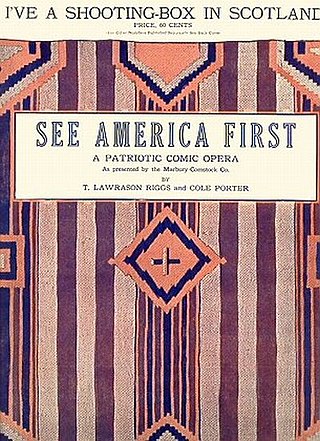
See America First is a comic opera with a book by T. Lawrason Riggs and music and lyrics by Cole Porter. The first work by Porter to be produced on Broadway, it was a critical and commercial flop.













